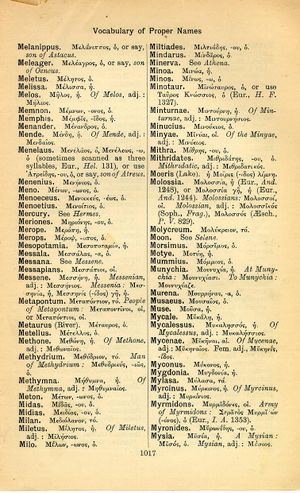Midas: Difference between revisions
Περὶ τοῦ ἐπέκεινα τοῦ νοῦ κατὰ μὲν νόησιν πολλὰ λέγεται, θεωρεῖται δὲ ἀνοησίᾳ κρείττονι νοήσεως → On the subject of that which is beyond intellect, many statements are made on the basis of intellection, but it may be immediately cognised only by means of a non-intellection superior to intellection
(D_5) |
(Gf-D_5) |
||
| Line 1: | Line 1: | ||
{{WoodhouseENELnames | {{WoodhouseENELnames | ||
|Text=[[File:woodhouse_1017.jpg|thumb|link= | |Text=[[File:woodhouse_1017.jpg|thumb | ||
|link={{filepath:woodhouse_1017.jpg}}]]Μίδας, -ου, ὁ. | |||
}} | }} | ||
{{Lewis | {{Lewis | ||
Revision as of 07:42, 14 August 2017
English > Greek (Woodhouse)
Μίδας, -ου, ὁ.
Latin > English (Lewis & Short)
Mĭdas: or Mĭda, ae, m., = Μίδας,
I son of Gordius, and king of Phrygia. At his request he received from Bacchus, who wished to prove his gratitude for the hospitality Midas had accorded him, the boon that everything he touched should turn to gold. But as this extended also to food and drink, he implored the assistance of the god. The latter told him to bathe in the river Pactolus, the sands of which from that time became mixed with gold. Midas decided in favor of Pan a musical contest between him and Apollo; who in revenge provided Midas with ass's ears, Ov. M. 11, 85 sq. and 146; Hyg. Fab. 191; Cic. Tusc. 1, 48, 114; id. Div. 1, 36, 78; Mart. 6, 86, 4.—Midas is said to have discovered the use of lead and tin, Hyg. Fab. 274.
Latin > French (Gaffiot 2016)
Mĭdās,¹⁴ æ, m. (Μίδας), Midas [roi de Phrygie] : Ov. M. 11, 85 ; Cic. Tusc. 1, 114 ; Div. 1, 78.

